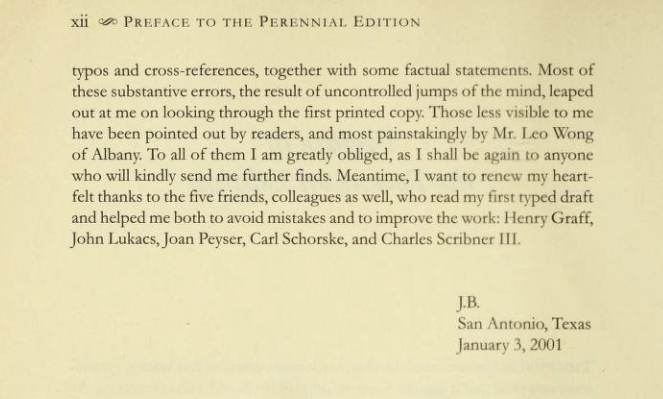What is your level of confidence that the pendulum has swung so far that we will head back to some form of truth and reason? —Jim Sano
Opinions will change, but the Powers That Be will try to prevent the swinging back, and the pendulum may break.
I’m glad that Internet Archive provides the Perennial Edition of From Dawn to Decadence.

We are none of us tolerant in what concerns us deeply and entirely. —Coleridge, quoted in Barzun, From Dawn to Decadence, p. 273
This means that in a free society the State must be tolerant, within the limits of public order.
There are 147 en dashes in Gospel Scenes and Reflections and one em dash.
If Henry Adams were the echo of Gibbon, we would not greatly value the pastiche. —Barzun, From Dawn to Decadence, p. x
It is waste of breath to point out that every observer is in some way biased. It does not follow that bias cannot be guarded against, that all biases distort equally, or that controlled bias remains as bad as propaganda. —Barzun, From Dawn to Decadence, p. x
Me: Did you have a good shower?
Visitor: Great! Look how clean I am!
Me: Haven’t you heard? Albany dirt is invisible.
Sketch of an inaugural lecture on The Christian Renaissance of the 20th Century to be given by Alan Jacobs. HT @ReaderJohn
“The Greatest of Sinners” isn’t a competition.
On earth as it is in hell.
A Man's A Man for A' That
There is a commonplace in St. Thomas Aquinas’s psychology according to which all learning occurs within an imagination and an experience stirred by a man’s own history and encounter with being. Two students can grasp the same reality, but each one will do so according to his own peculiar mode of knowing. —Frederick Wilhelmsen, “The Great Books: Enemies of Wisdom?"
We each understand “man” and “woman” and “——man” and “——woman” according to our own peculiar modes of knowing; and with free speech, each of us has the right to express our understandings.
Tales from the Collection: Mary Murphy, Morely[sic] the Toothless Mastadon[sic] This homebrew rehearsal was apparently considered fit for publication.
George I of England did not understand a word of English and, as his ministers were similarly ignorant of German, he was compelled to resort to a dubious Latin when he wished to communicate with them. —Hazen, Modern Europe, p. 51.
One large disappointment about Catholicism is its seeming inability to discern evil men. Recent examples appear to include McCarrick, Maciel, Vanier, Rupnik, and perhaps others still in power. The Church lives in reality. Why is it blind to evil men?
One doubts that the synod is the work of the Holy Spirit, since the Holy Spirit daily whispers inspirations that Church leaders appear not to hear.
Let us use inaccurate words, if necessary, in exchange for understanding each other quickly. —Eugenio d’Ors
“Everything that is not tradition is plagiarism,” according to Salvador Dali. —Frederick Wilhelmsen
Wilhelmsen: The Great Books: Enemies of Wisdom?
Great Books fanaticism ignores the audience and in so doing reveals its parochialism, its innocence towards history. We no longer live in a book-dominated culture; to treat our students as though we did is to violate their very psychic structure. Today we enter a new kind of Middle Ages, but Great Books people still absent-mindedly behave as though they were living in the eighteenth or nineteenth century. —Frederick Wilhelmsen
I never read a book when I am away, and seldom when I’m at home.